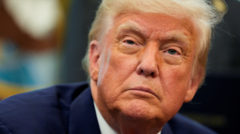Amid escalating tensions between India and Pakistan over the Kashmir region, President Donald Trump's proposal for mediation has unsettled Indian officials, as the country traditionally rejects external intervention in this long-standing conflict. While India aims to maintain robust ties with Washington, it grapples with balancing domestic political sentiment against the backdrop of international pressures.
Trump's Kashmir Mediation Proposal Strains India's Foreign Policy Stance

Trump's Kashmir Mediation Proposal Strains India's Foreign Policy Stance
Trump's unexpected offer of mediation in the Kashmir conflict challenges India's long-standing refusal of third-party intervention, putting New Delhi in a delicate diplomatic position.
India was taken aback this weekend when President Donald Trump offered to mediate the long-standing Kashmir dispute with Pakistan, marking a significant shift in U.S. diplomatic engagement in South Asia. Traditionally, India has staunchly rejected third-party involvement in its relationship with Pakistan, viewing the Kashmir issue as an integral and non-negotiable part of its sovereignty.
On Saturday, Trump proclaimed on social media that a “full and immediate ceasefire” had been brokered by the U.S. following several days of intense cross-border hostilities. He further expressed his willingness to “work with both sides” to find a solution to the Kashmir issue that has persisted since India and Pakistan gained independence in 1947. Both nations lay claim to the region but govern it in parts, leading to decades of conflict.
This fresh wave of violence stemmed from an incident in Indian-administered Kashmir, where an attack on tourists resulted in 26 deaths, triggering air strikes by India aimed at targeting alleged terrorist infrastructure within Pakistani territory. Islamabad has strenuously denied any involvement in the attack, further escalating tensions.
Trump’s intervention came amid fears of a spiraling conflict between the two nuclear powers, as combat aircraft and missiles engaged each other's military assets in heightened skirmishes. Indian experts are expressing concern that Trump's mediation offer contradicts the country’s long-held position against outside influence in resolving bilateral matters.
The former Indian foreign secretary, Shyam Saran, voiced widespread apprehensions that Trump's remarks would be viewed unfavorably in India, reinforcing the sentiment that any third-party involvement could jeopardize India's standing. This is especially true following the revocation of Jammu and Kashmir's special status by the Indian government in 2019, which incited widespread unrest and resistance within the region.
The opposition Congress party has called for clarity from Prime Minister Narendra Modi's administration, demanding consultations about the implications of Trump's announcement on third-party engagement with Pakistan. Furthermore, U.S. Secretary of State Marco Rubio mentioned the potential for a broader dialogue on key issues, catching Indian officials off-guard.
Historically, India has resisted foreign meddling, often citing the 1972 Simla Agreement, which obliges the two nations to resolve disputes through peaceful bilateral negotiations. Yet, opposition voices in Pakistan view U.S. involvement as a potential breakthrough due to India’s refusal to engage directly.
Amidst these tensions, Foreign Minister Subrahmanyam Jaishankar reiterated India's commitment to combatting terrorism without compromise, signaling that New Delhi may not be inclined to renew direct dialogue with Islamabad soon. Meanwhile, voices from Pakistan are portraying Trump’s offer as a moral victory, arguing that external intervention is necessary to ensure dialogue amidst a climate of distrust and hostility.
As geopolitical dynamics shift, India is now faced with the chore of balancing the desire for a strong partnership with the U.S. against the sensitivities surrounding its territorial claims, especially as Washington has been a crucial ally in India's military modernization efforts. In these turbulent times, Modi’s administration must navigate its diplomatic strategy carefully to avoid domestic backlash while maintaining vital foreign relations. The political landscape in South Asia remains unpredictable, with the stakes higher than ever for both India and Pakistan.


















